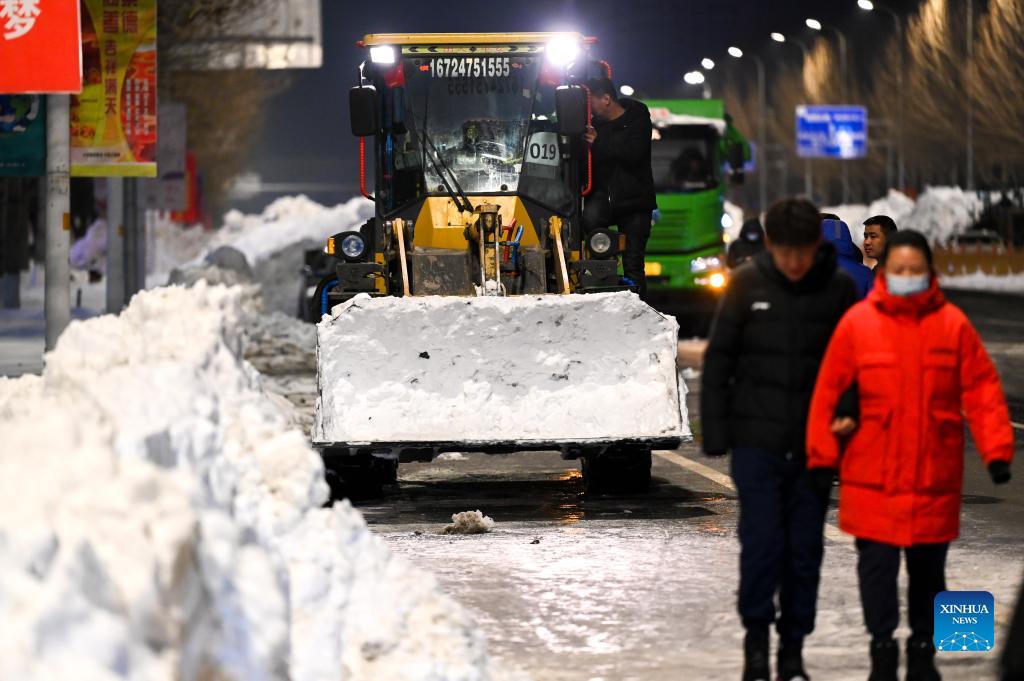Alerts issued as cold air hits nation
 0 Comment(s)
0 Comment(s) Print
Print E-mail China Daily, November 22, 2021
E-mail China Daily, November 22, 2021

The National Meteorological Center released three separate alerts for cold air, strong winds and snowstorms on Sunday as the cold air mass that began to affect China on Friday marched across the country.
According to weather.com.cn, which is run by the China Meteorological Administration, global warming has resulted in more frequent weather extremes being seen this year, with record-breaking cold waves occurring in late October and early November.
By Sunday morning, a cold wave stretched from the west of Hebei province to the west of Henan province, causing temperature drops of between 4 C and 8 C in Shanxi province and Hebei, the center said. The Xinjiang Uygur autonomous region and parts of Gansu province also experienced temperature slumps of more than 10 C.
On Monday, the cold air is expected to rapidly descend southward and affect most of the central and eastern parts of China, the center forecast.
By Tuesday, the Bohai, Yellow and East China seas will face strong winds of up to about 100 kilometers per hour, it said.
The winds are expected to carry floating sand and dust to northern areas, including Beijing.
Snow was forecast to hit the northeast from Sunday to Wednesday, with blizzards expected in Heilongjiang and Jilin provinces, the center said.
New snow accumulation over the period is expected to reach up to 40 centimeters in Heilongjiang, adding to snow from last week.
On Sunday, the Heilongjiang provincial government announced a Level II warning for weather disaster emergency response, the second highest in a four-tier warning system.
Agricultural authorities sent experts to help farmers protect corn and rice stored outdoors from snow and ice. Provincial capital Harbin will suspend schools on Monday, the city's education department said.
Fang Chong, chief forecaster of the center, said that the harsh weather is being caused by a cold air mass originating in Siberia, Russia.
"This bout of cold wave will sweep across China faster than the previous one in early November because airflow is stronger under the current weather conditions," he said. "The weather system is more complicated than before, with blizzards, rain, sand and dust finding their paths in North and South China."
The website said it was a coincidence that a cold wave decided to descend upon China over the weekend, inhibiting outdoor activities, but that if global warming intensifies, it could lead to more frequent cold waves that will not be so coincidental.
The website said weather from the Arctic is also contributing to the extreme conditions.
"Global warming warms the Arctic region, which is resulting in a smaller temperature difference between the polar and mid-latitude regions," it said.
"A weaker air pressure difference makes the westerly jet stream that forms from the pressure difference weaker and unable to enclose the cold air mass in the Arctic. When the cold air mass breaks through and expands southward, it can cause extreme weather in China."
That was the case with the super cold wave that broke temperature records in many parts of the north in January, it said.
The meteorological center warned that snowfall accompanied by strong winds will lead to blizzards in some areas, especially in Heilongjiang, causing problems for transportation, urban operations and agriculture. It is necessary to be highly vigilant against the possibility of severe snowfall.
People in high-altitude areas, including the Yunnan-Guizhou Plateau in the southwest, also need to be alert for snow and freezing rain.






Go to Forum >>0 Comment(s)